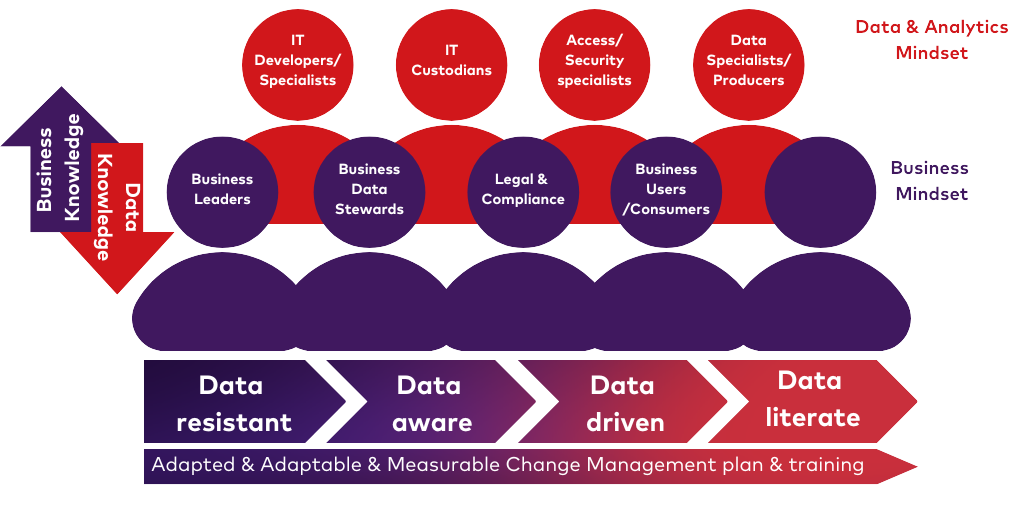From Data Resistant to Data Literate
9 April 2024

In today's business world, the shift towards becoming a data-driven organization is no longer a mere option but a necessity. This transition is fueled by the need for well-informed decision-making, a challenge that requires organizations to embrace a comprehensive change management strategy. In this blog post, we explore the importance of such a strategy and the foundational elements crucial for a successful data journey.
Embracing a Data-Driven Culture
The Three Pillars of a Data-Driven Organization
The journey towards becoming a data-driven organization rests on three key pillars: Data Governance, the right Tools, and motivated people.
1. Data Governance:
- Definition and Framework: Data Governance establishes the foundation by providing the definition, framework, policies, and processes for data within the organization.
- Roles & Responsibilities: It defines roles and responsibilities, ensuring a clear understanding of who is accountable for data-related activities in the business.
2. The Right Tools:
- Data & Access Management, Data Quality, and Data Governance: Utilize user-friendly solutions to document terms and reports, control data access, enforce data quality rules, and ensure compliance with governance policies.
- (Data) Reporting: Implement tools for visualizing information crucial for business operations.
- Training & Communication: Facilitate effective training and communication through e-learning, manuals, newsletters, and collaborative platforms.
3. Motivated People:
- Business: Engage business stakeholders actively; their knowledge is essential in judging the validity of definitions and determining data confidentiality levels.
- IT & Data: Leverage the expertise of IT and data professionals to guide and implement tools that align with business needs.
- Leadership: Obtain leadership buy-in and direction to prioritize data, allocate dedicated budget and resources, and shape the overall data strategy.
Crafting an Effective Change Management Strategy
Transitioning to a data-driven culture requires a carefully crafted change management strategy that is adapted, adaptable, and measured.
- Adapted: Recognizing the uniqueness of every industry, company, department, and individual, the change management strategy should cater to the specific needs and pace of each stakeholder group.
- Adaptable: Acknowledging that changes can occur unexpectedly, the strategy should be flexible enough to accommodate unforeseen circumstances and adjust to evolving resistance levels.
- Measured: Continuous measurement of the change is imperative to ensure that efforts yield the expected impact. Metrics such as training attendance, report/solution logins, and the inclusion of new data under governance serve as key indicators.

Convincing Your Organization of the Benefits
In the pursuit of a sustainable change, the recipe is not imposition but persuasion. To foster a data-driven culture, organizations must emphasize the underlying benefits. A truly efficient data-driven organization requires collaboration, understanding, and trust between IT (Data) stakeholders and the Business. By answering questions about data sources, definitions, and calculations, organizations build a foundation of trust.
In conclusion, the journey from being data-resistant to data literate involves a strategic blend of governance, technology, and people. By embracing a tailored change management strategy and fostering a culture of collaboration and trust, organizations can successfully navigate this transformation and unlock the full potential of their data. Need any assistance with this task? We have all the right experts here with us at Datashift. Do not hesitate to contact us, we are always ready to listen!
